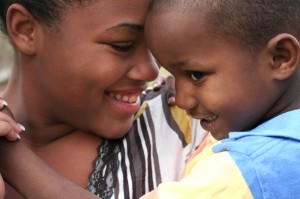The Value of Being Personal with Your Children

Excerpt from Compassionate Child-Rearing: An In-Depth Approach to Parenting by Robert Firestone, Ph.D.
It is vital for parents to respond as real people to their children, rather than role-playing or acting patronizing, strategic, or phony in their interactions with them. It is impossible for parents to “learn how to talk to their children” in a manner that is contrary to their underlying attitudes or way of being. Indeed, any technique, attitude, or approach to childrearing that treats children as objects to be manipulated by certain parental styles of communications is detrimental to their development. Many adult patients have complained bitterly about being treated as an object by their families.
Children need adults who relate to them directly; they need people who are open with them about their real thoughts and feelings. This type of interaction is not generally the case between parent and child. Instead, many parents question the child in an unfeeling manner, asking, “How was school today?” “Did you have fun?” or inquire about his activities in a rote or mechanical style that fails to lead to a real relationship. Very often fathers and mothers do not really listen to or respond sensitively to the answers to these questions, and children, in turn, learn to answer insincerely.
This type of parent-child relationship is best illustrated by a story a mother related about her interaction with her 8-year-old daughter. She began:
The other day JoAnn asked me if I would take her shopping with me–she really wanted to spend some time with me. So we got into the car, and by the time we had gone a few miles, I realized that I hadn’t said anything to her. I thought: “This is really strange, because she really wanted to be with me, but I’m not being with her. I’m not saying anything.”
As I thought more about this, I began to realize that there are two kinds of time for me. There is time with adults, where I’m aware that I’m with another person and I’m talking to that person. If an adult had been driving with me, I would have talked to them. Then I realized that the other kind of time is time alone or time with my children. But it’s the same kind of time, time alone and time with my children. When I’m with them, it’s exactly the same as when I’m alone. I’m not being with a person.
She went on to explain: And then I thought that when I was planning to have children, if somebody had asked me two questions and said, “Which one of these alternatives describes what you felt when you thought about having children?: ‘Do you want to have another person in your life who is close to you, that you can relate to, that you’re involved with, that you care about, that is in your life everyday? Do you want another person in your life like that?'”
The other question would be, “Would you like to have a new sofa? Would you like something new for your house, or something like that?” I’d have to admit that the way I thought about having children and the way I see most people thinking about having children is more like buying a sofa than having a new person in their lives.
I look at pictures in many family photo albums and see the parents standing there next to their children, but it’s almost like they’re standing next to an inanimate object. It’s like the kids were props. That’s the way it was in my family. I also hear people talking to children in ways that they would never talk to another adult.
It was interesting, because after I had that train of thought, the ride with JoAnn was one of the nicest times I’ve ever spent with her. I started talking to her, and it was more like a conversation that I have with one of my friends. We just talked about different things we had feelings about. It was much more like being with a person.
Children search the faces of their parents for genuine feeling contact. They have strong needs to feel the humanity of their parents, to see beyond the roles of “Father” and “Mother.” Parents spend the majority of their time in a defended state and generally maintain a mask or facade. However, when they behave in a manner that is natural or personal and dispense with roles, they are experienced by their children as human and lovable. The child desperately needs to feel love for his parents, and if he is deprived of the opportunity, it causes him or her unbearable pain. The child who is kept at a distance or provoked into a negative or hostile posture toward his parents feels alienated and suffers intense guilt reactions. In a sense, he is bent out of shape psychologically and loses contact with himself. In addition, he is often punished and accused of, or defined as, not being a loving person. It is crucial that parents come to realize how important it is for their children to be allowed to love them. It is often difficult, however, for them to see the significance of this principle because most people place so little value on their real selves and natural attributes.
In general, we encourage parents to be personal in relating to children–to talk about their own feelings and life experiences, much as they would to a friend. This does not imply that they would “dump” their problems on their children or make immature demands on them for comfort or reassurance; rather, it implies parents’ sharing their world with their children and allowing their children to share their world with them.
One Comment
Leave a Reply
You must be logged in to post a comment.










There is a driving need to be honest and open with your children, especially as they grow older. I appreciated the line that stated: “…they need people who are open with them about their real thoughts and feelings.”